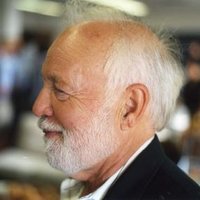
Isadore Manuel Singer
Professor of Mathematics, Emeritus
Isadore Manuel Singer was born in Detroit on May 3, 1924. He received an undergraduate degree in physics from the University of Michigan before serving in the Philippines in World War II. After the war he decided that he needed more mathematical training to do physics and obtained a masters in mathematics from the University of Chicago. He then decided that he preferred mathematics and went on to receive his PhD from the University of Chicago in 1950. Singer held postdoctoral positions at MIT, UCLA, Columbia and the Institute for Advanced Study, before taking a position at MIT in 1956. He was a faculty member in the UC Berkeley mathematics department between 1977 and 1984, before returning to MIT, from which he retired in 2010.
Singer's main research interests were differential geometry and functional analysis. These came together in the Atiyah-Singer index theorem, proved with Michael Atiyah in 1962. Singer was visiting Atiyah in Oxford when Atiyah asked him why a certain fraction (the A-hat genus of a spin manifold) always turned out to be a whole number. Atiyah already knew an answer but he felt that there should be a deeper reason. Singer had the insight that it was a whole number because it was counting something, namely the number of solutions to a certain equation, the Dirac equation. Building upon this, Atiyah and Singer proved the index theorem, which unified several previous results from geometry and topology, and had many other implications. For the next fifteen years, Atiyah and Singer worked on extensions and ramifications of their result.
Starting around 1975, Singer became interested in recent developments in theoretical particle physics and their relation to differential geometry. He ran a seminar at Berkeley with a two-part format. The first hour was a segment of a topics course, taught by Singer, that focused on a subject of current interest in mathematical physics, such as the Yang-Mills equation or supersymmetry. The second hour featured a guest speaker. The after-seminar activity usually consisted of pizza and beer at LaVal's Pizza or a dinner at the Mandarin Garden Restaurant. The seminar attracted a wide range of participants from both the mathematics and physics departments. While at Berkeley, Singer supervised the theses of four students, of whom he was very supportive, including the author of this Memorial. At one point Singer’s students included sons of Betty Friedan and Phyllis Schlafly, two prominent women with very different views about the women’s movement.
Singer was involved in a proposal for a Mathematical Sciences Research Institute (MSRI), to be located on the grounds of UC Berkeley. The proposal was approved by the National Science Foundation and MSRI started its operations in temporary headquarters in a university printing building on Oxford Street. It eventually moved to its present location on the hill near the Lawrence Hall of Science.
Singer was a member of the White House Science Council from 1982 to 1988. He left with a favorable impression of the scientific talent in government service, saying that the choice of experts for science policy reflected greater soundness of judgment, in many cases, than did tenure decisions in academia. Singer also acquired a marked respect for President Reagan, whom he considered to be a much more complex individual than would be indicated by the popular caricature of the time.
Singer was a member of the National Academy of Sciences and the American Academy of Arts and Sciences. Among the honors received by Singer were the Bôcher Memorial Prize (1969) and the Steele Prize for Lifetime Achievement (2000), both from the American Mathematical Society; the Eugene Wigner Medal (1988); the National Medal of Science (1983); and the Abel Prize (2004), shared with Michael Atiyah.
Among Singer's outside interests, he was a jazz fan and recalled going to hear Ella Fitzgerald in his youth. He was also an avid tennis player, playing well into his 80's.
Singer died on February 11, 2021, in Boxborough, Massachusetts. He is survived by his wife Rosemarie Singer, his children Eliot, Natasha, Emily and Annabelle, his stepchildren Giles and Melissa, and four grandchildren.
John Lott
2021
